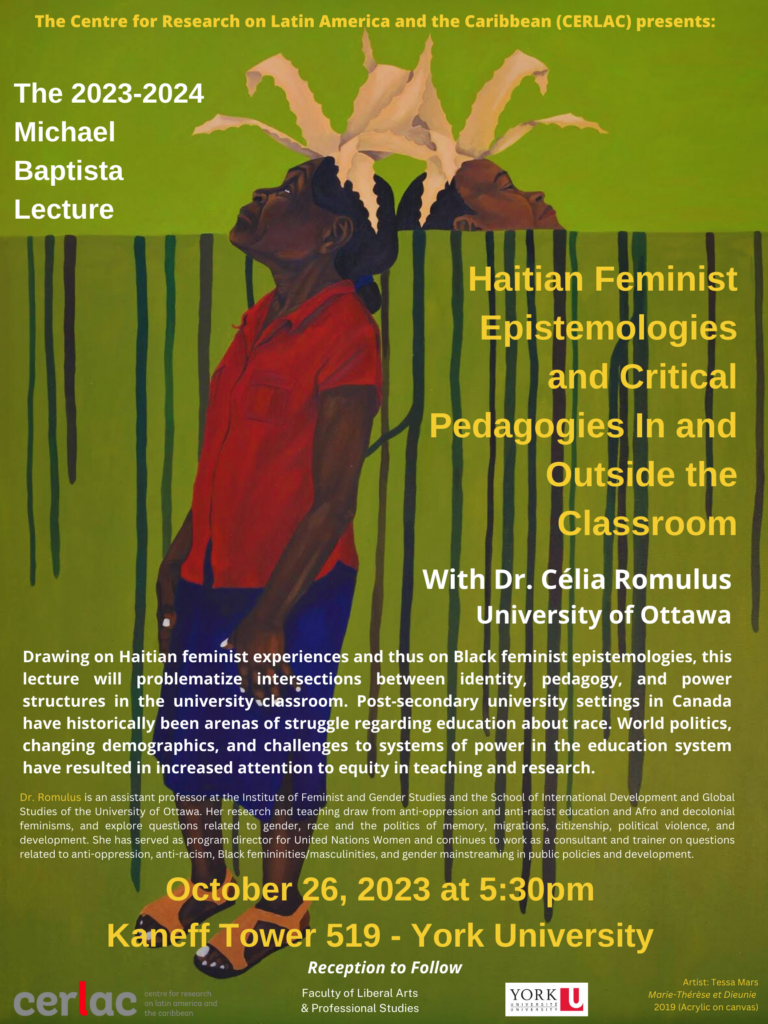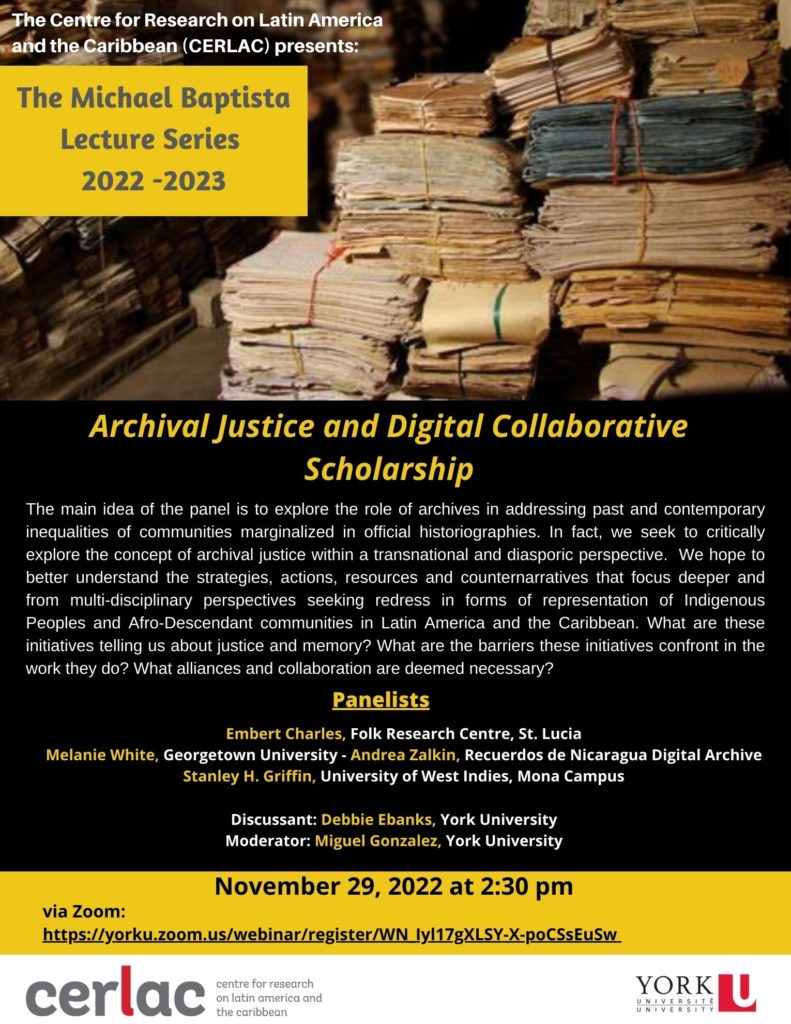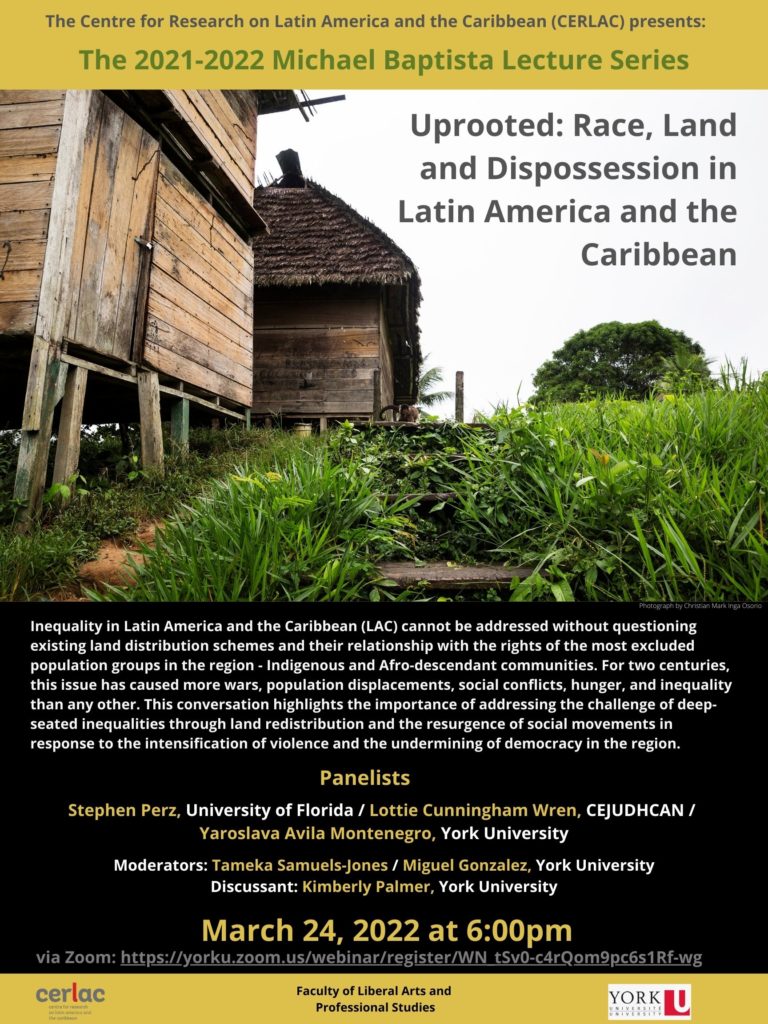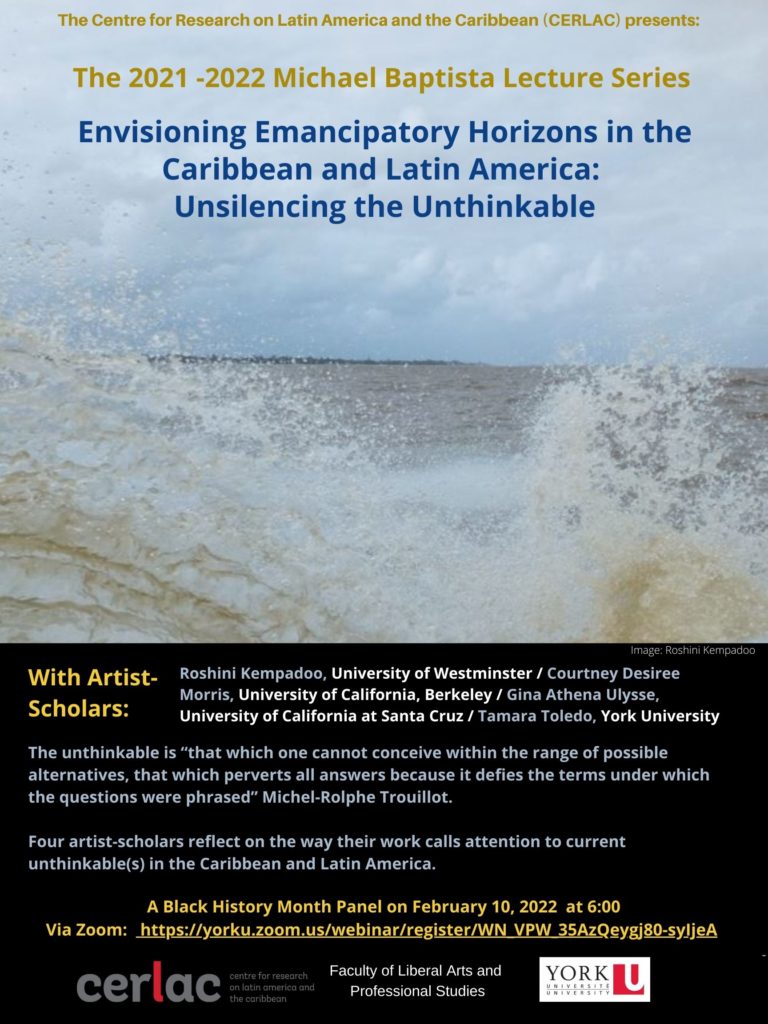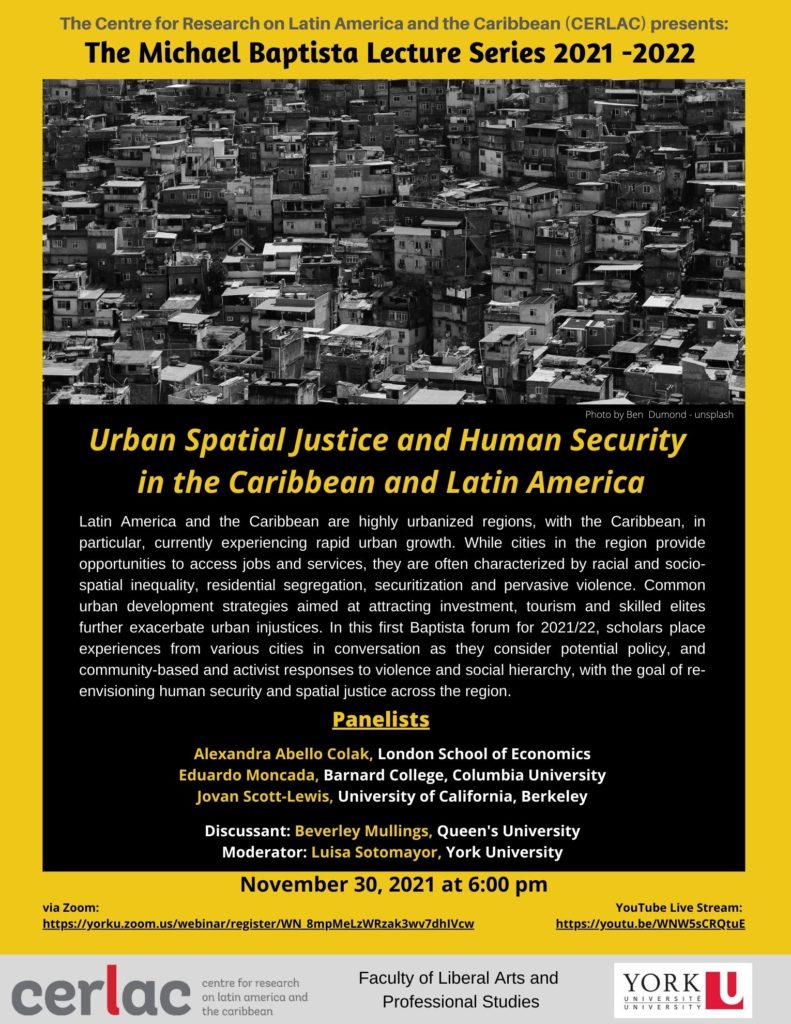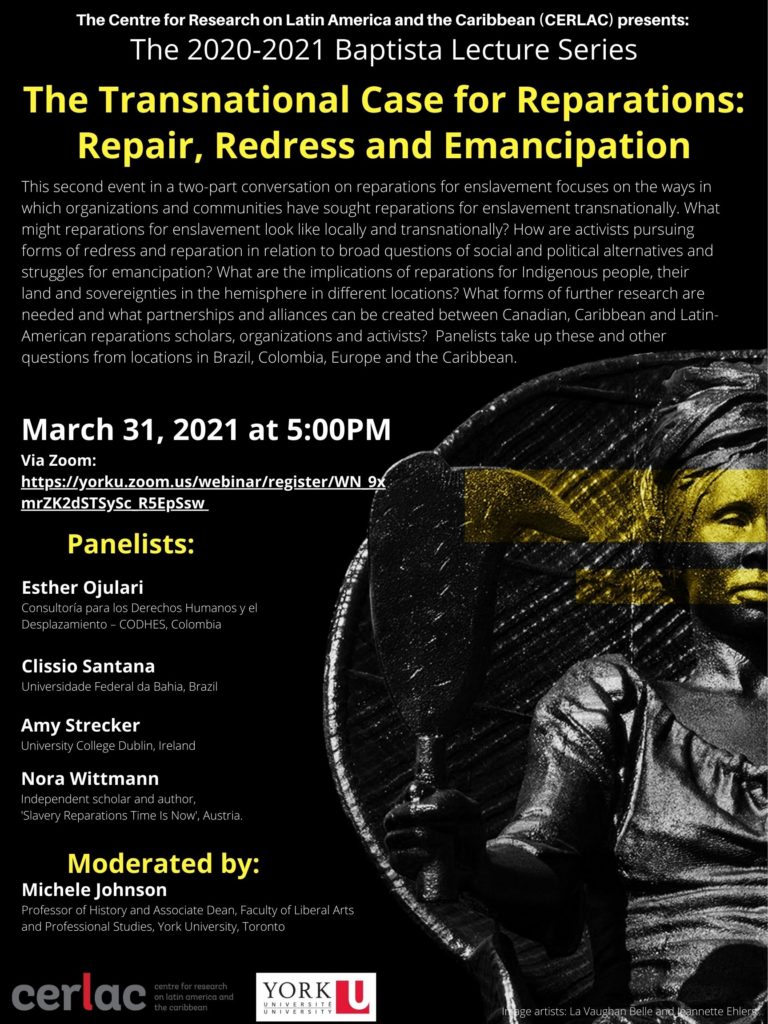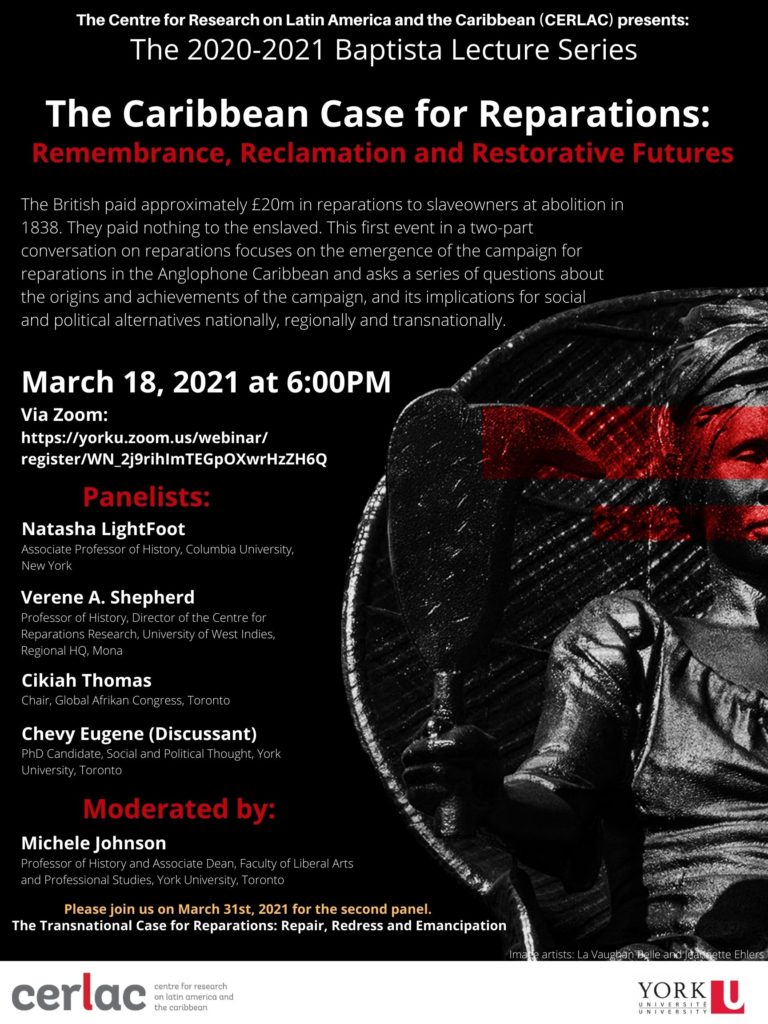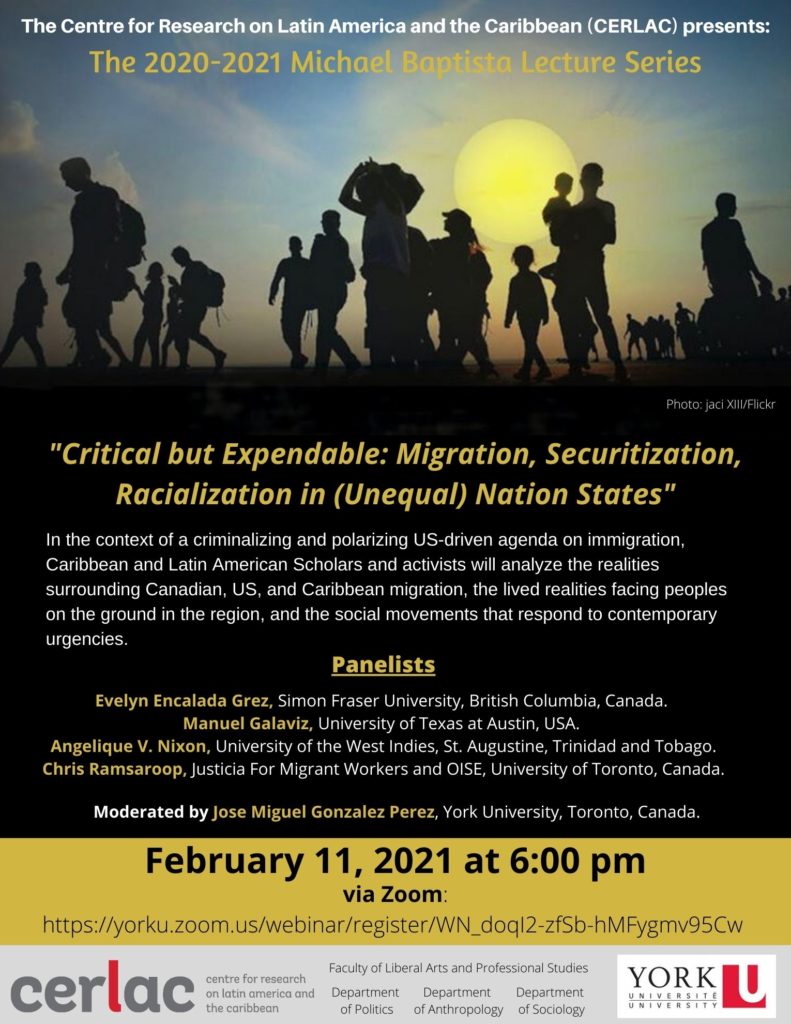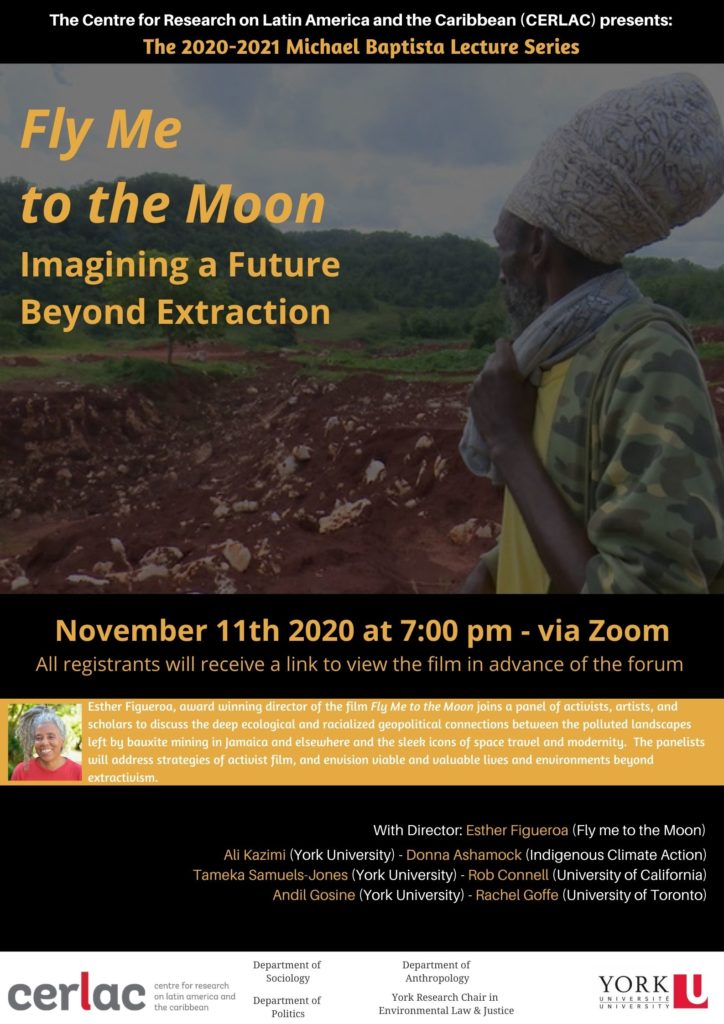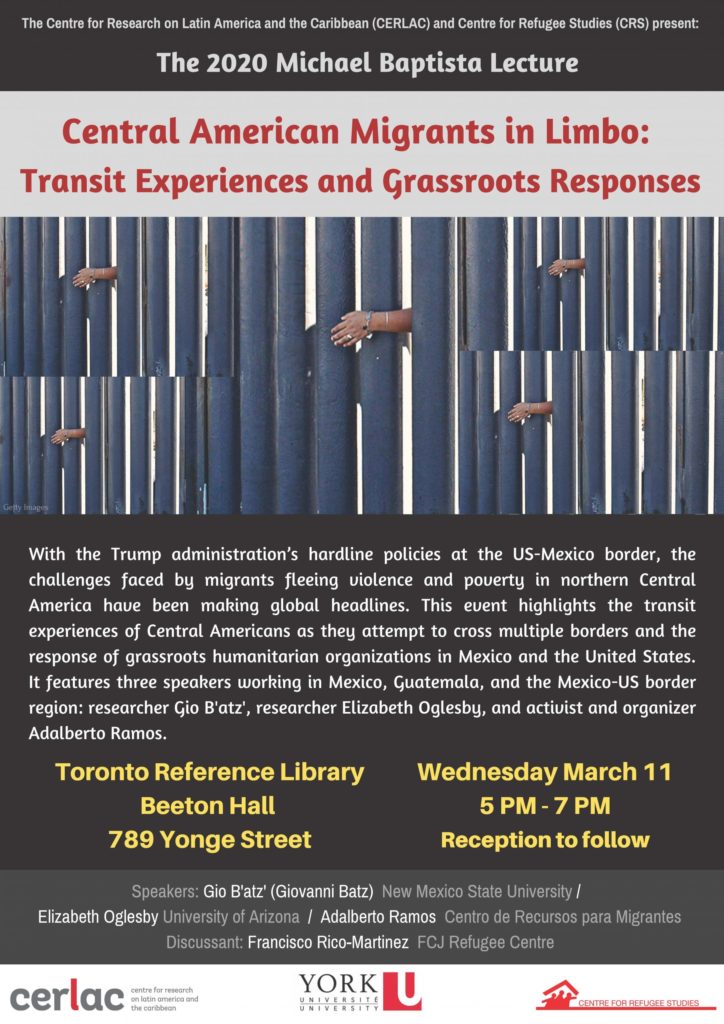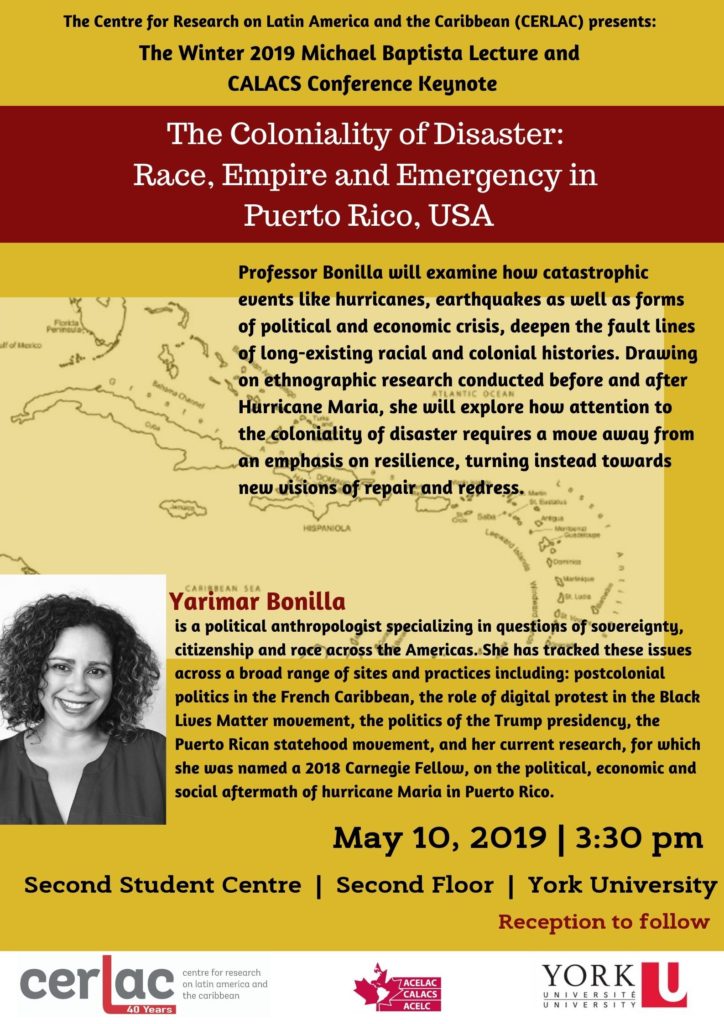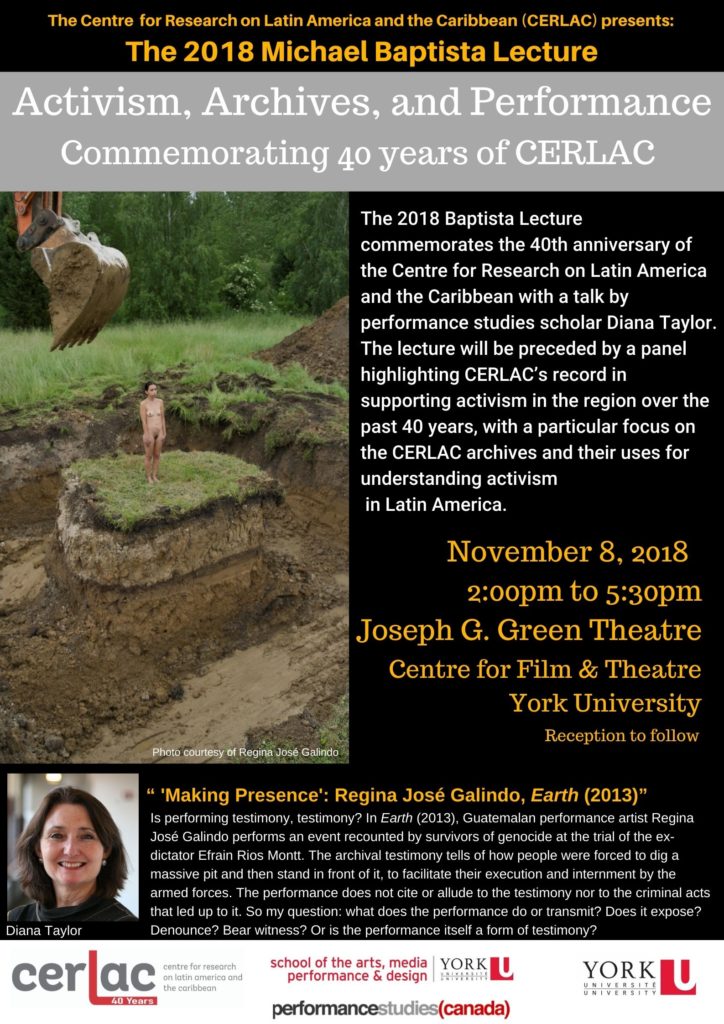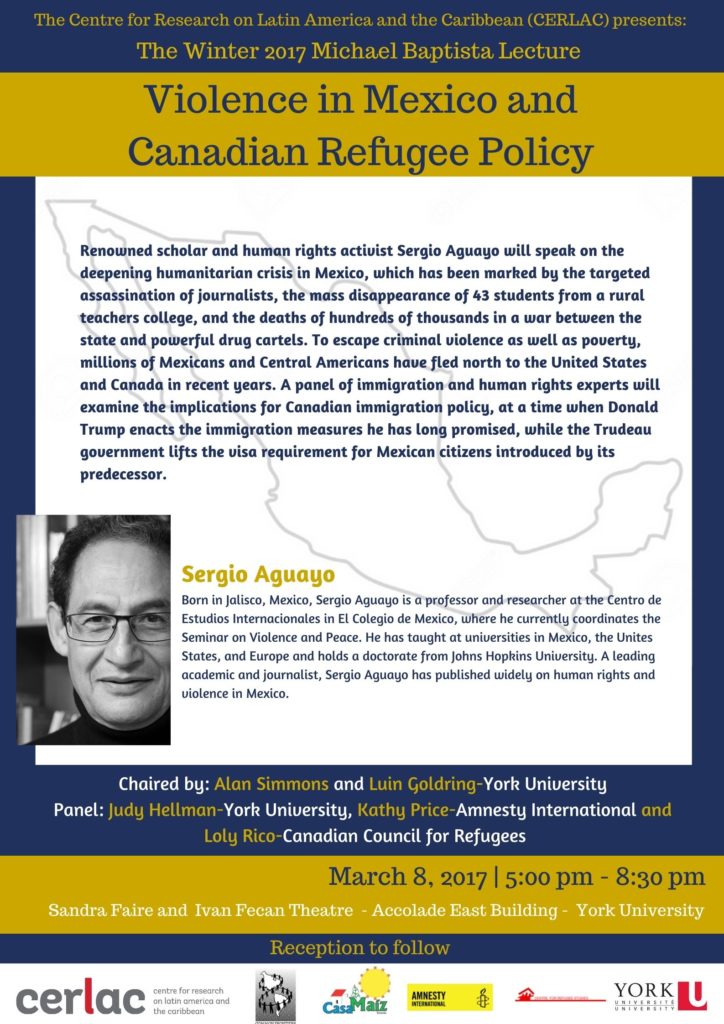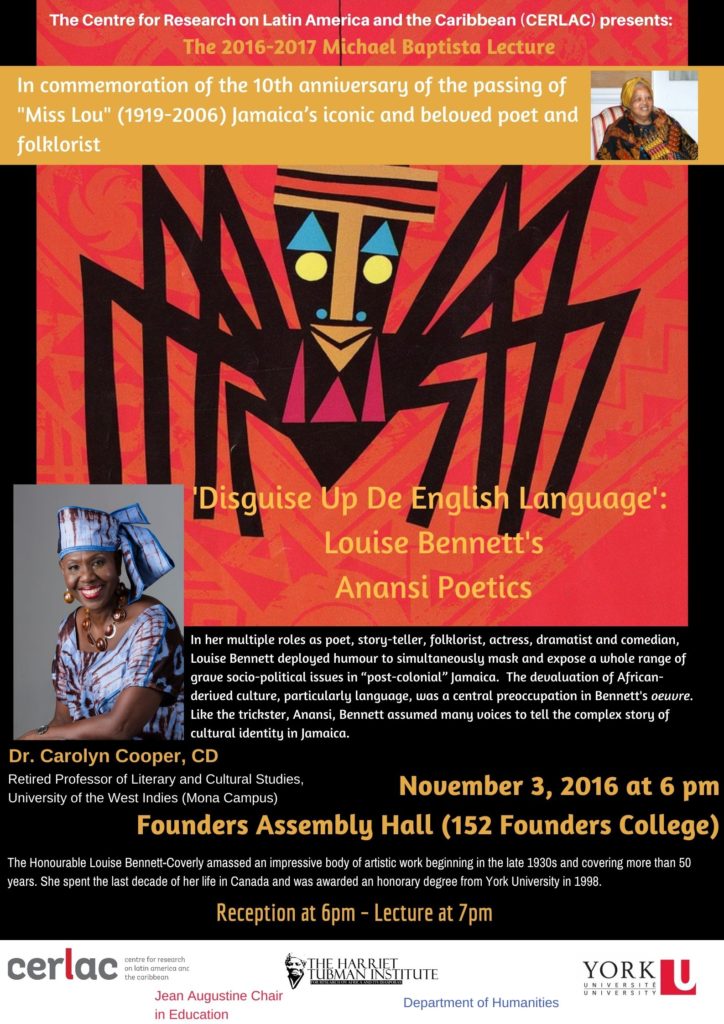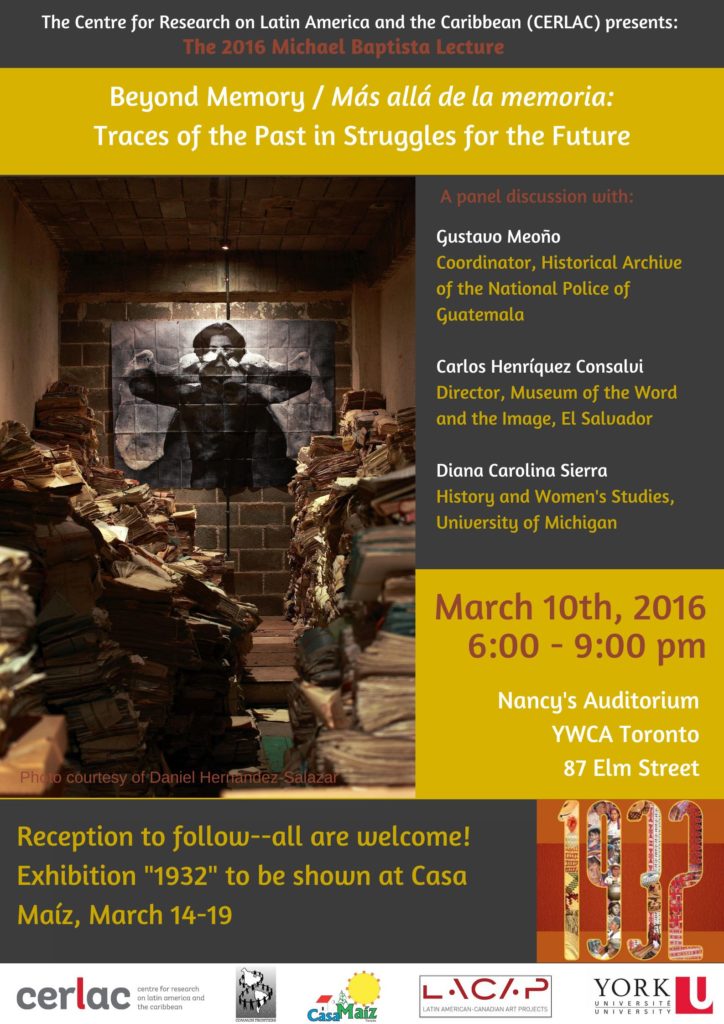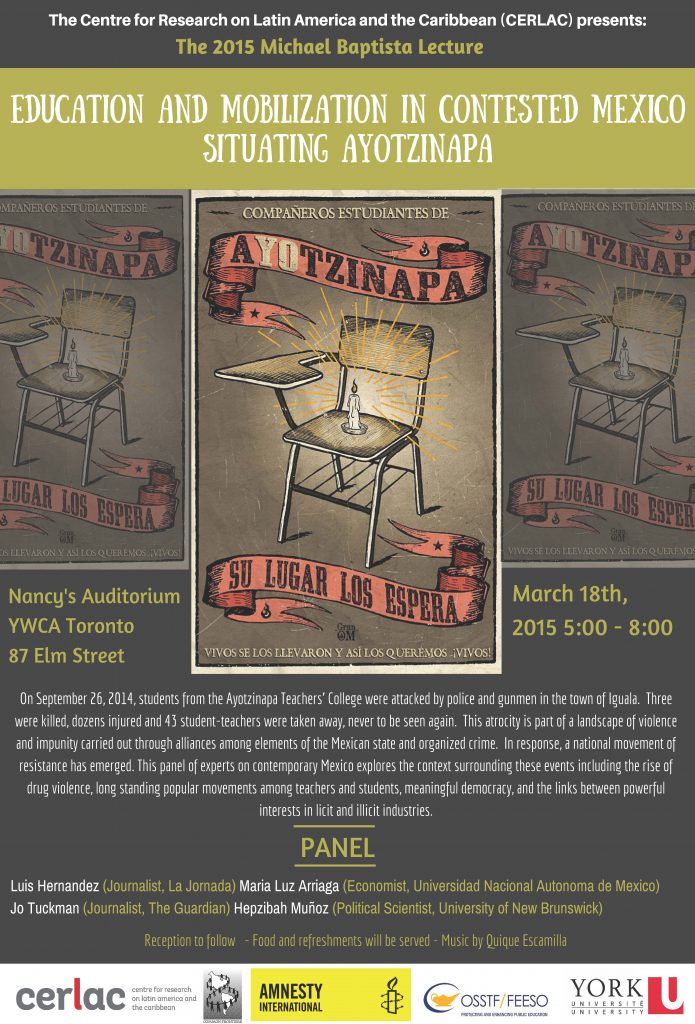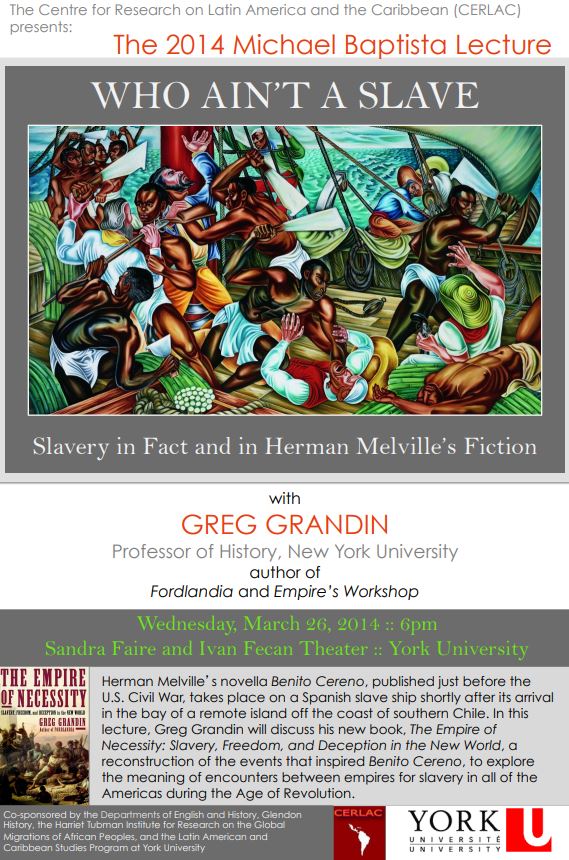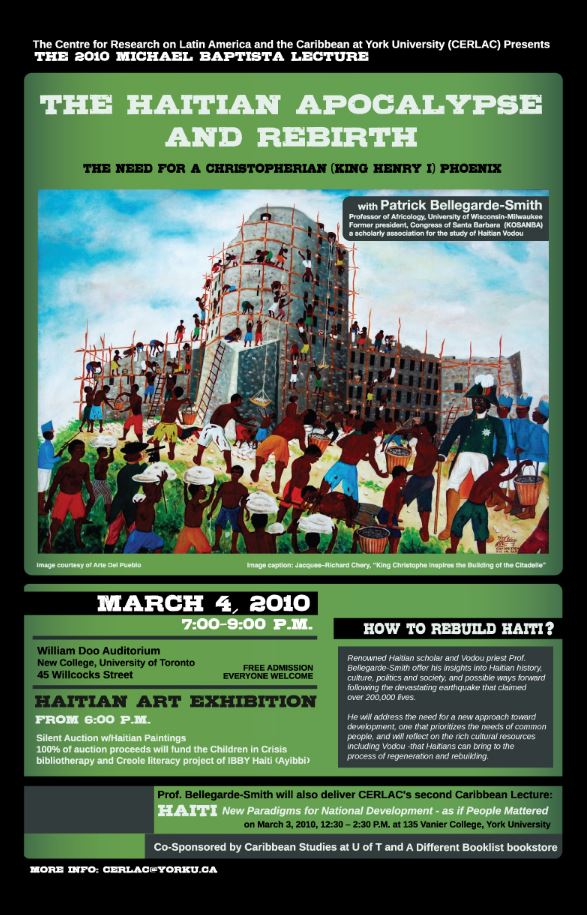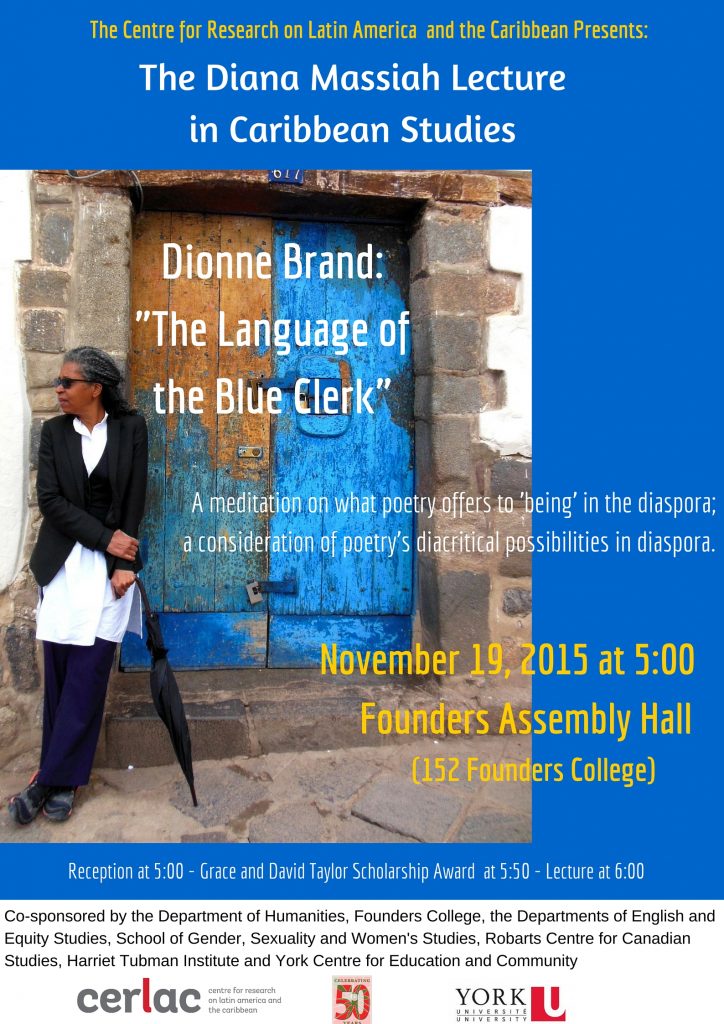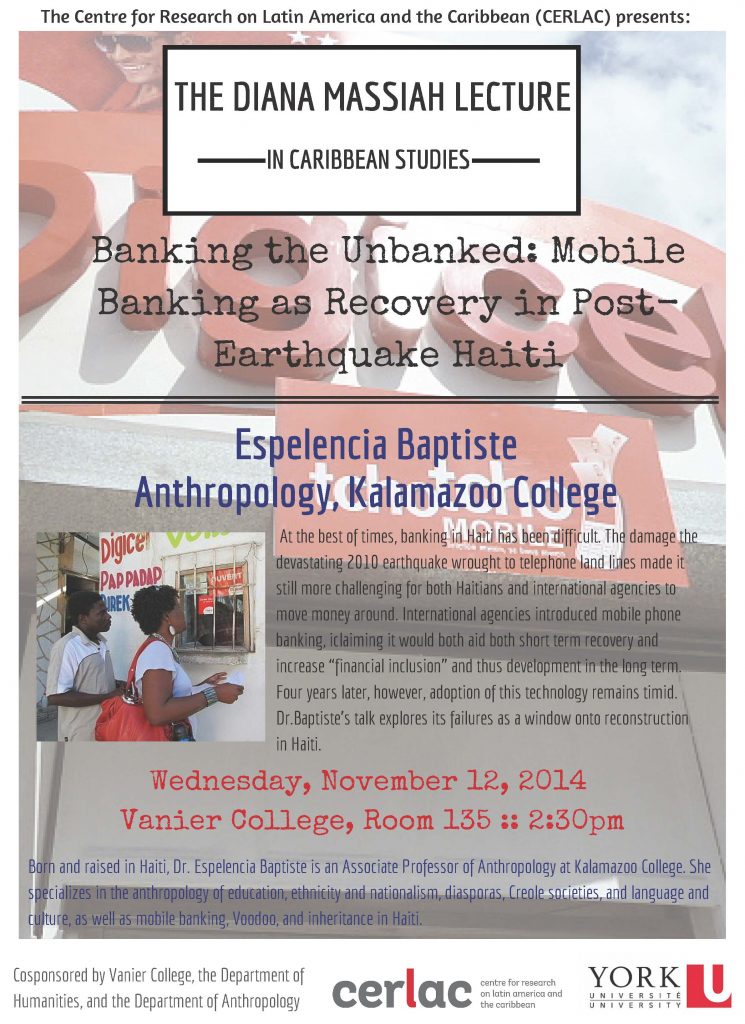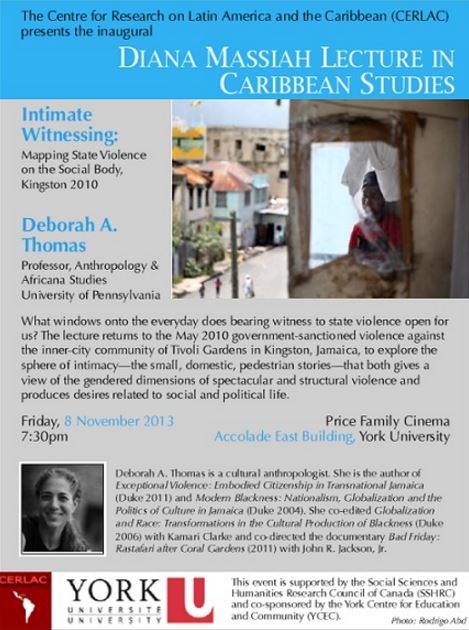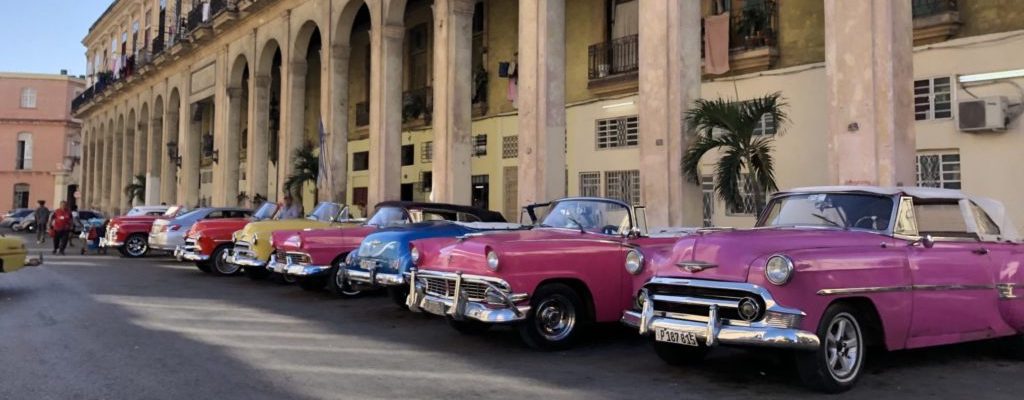
The Michael Baptista Lecture
Haitian Feminist Epistemologies and Critical Pedagogies In and Outside the Classroom
October 26, 2023
Keynote Speaker: Dr. Celia Romulus. She is an Assistant Professor at the Institute of Feminist and Gender Studies and the School of International Development and Global Studies at the University of Ottawa. Discussant: Bianca Beauchemin, York University.
Click here or on the poster to watch the lecture.
Archival Justice and Digital Collaborative Scholarship
November 29, 2022
Panel: Embert Charles, Msgr. Patrick Anthony Folk Research Centre (FRC). Melanie White, Georgetown University. Andy Zalkin, Recuerdos de Nicaragua Digital Archive. Stanley H. Griffin, University of West Indies, Mona Campus. Discussant: Debbie Ebanks, York University. Moderator: Miguel Gonzalez, York University.
Click here or on the poster to watch the lecture.
Uprooted: Race, Land and Dispossession in Latin America and the Caribbean
March 24, 2022
Panel: Stephen Perz, University of Florida. Lottie Cunningham Wren, CEJUDHCAN. Yaroslava Avila Montenegro, York University. Moderators: Tameka Samuel-Jones and Miguel Gonzalez, York University. Discussant: Kimberly Palmer, York University.
Click here or on the poster to watch the lecture.
Envisioning Emancipatory Horizons in the Caribbean and Latin America: Unsilencing the Unthinkable
February 11, 2022
Panel: Roshini Kempadoo, University of Westminster. Courtney Desiree Morris, University of California, Berkeley. Gina Athena Ulysse, University of California, Santa Cruz. Chair: Celia Romulus, York University.
Click here or on the poster to watch the lecture.
Urban Spatial Justice and Human Security in the Caribbean and Latin America
November 30, 2021
Panel: Alexandra Abello Colak, London School of Economics. Eduardo Moncada, Barnard College, Columbia University. Jovan Scott-Lewis, University of California, Berkeley. Discussant: Beverley Mullings, Queen's University. Moderator: Luisa Sotomayor, York University.
Click here or on the poster to watch the lecture.
The Transnational Case for Reparations: Repair, Redress and Emancipation
March 31, 2021
Panel: Esther Ojulari, Consultoría para los Derechos Humanos y el Desplazamiento – CODHES, Colombia. Clissio Santana,Universidade Federal da Bahia, Brazil. Amy Strecker, University College Dublin, Ireland. Nora Wittmann, Author, “Slavery Reparations Time is Now.” Moderated by Michele Johnson, Professor of History and Associate Dean, Faculty of Liberal Arts and Professional Studies, York University.
Click here or on the poster to watch the lecture.
The Caribbean Case for Reparations: Remembrance, Reclamation and Restorative Futures
March 18, 2021
Panel: Natasha Lightfoot,Associate Professor of History, Columbia University, New York. Verene A. Shepherd, Professor of History, Director of the Centre for Reparations Research, University of the West Indies, Regional HQ, Mona. Cikiah Thomas, Chair, Global Afrikan Congress, Toronto. Chevy Eugene (Discussant), PhD Candidate, Social and Political Thought, York University. Moderated by: Michele Johnson, Professor of History and Associate Dean, Faculty of Liberal Arts and Professional Studies, York University.
Click here or on the poster to watch the lecture.
Critical but Expendable: Migration, Securitization, Racialization in (Unequal) Nation States
February 11, 2021
Panel: Evelyn Encalada Grez, Simon Fraser University, British Columbia, Canada. Manuel Galaviz, University of Texas at Austin, USA. Angelique V. Nixon, University of the West Indies, St. Augustine, Trinidad and Tobago. Chris Ramsaroop, Justicia For Migrant Workers and OISE, University of Toronto, Canada.
Click here or on the poster to watch the lecture.
Fly Me to the Moon: Imagining a Future Beyond Extractions
November 11, 2020
Panel: Esther Figueroa, Director of Fly Me to the Moon. Doona Ashamock, Indigenous Climate Action. Ali Kazimi, York University. Rachel Goffe, University of Toronto. Andil Gosine, York University. Tameka Samuels-Jones, York University. Rob Connell, University of California (was not able to participate).
- To access Esther Figueroa's manifesto, please click here.
Click here or on the poster to watch the lecture.
Central American Migrants in Limbo: Transit Experiences and Grassroots Responses
March 11, 2020
Panel: Gio Bat'z, New Mexico State. Elizabeth Oglesby, University of Arizona. Adalberto Ramos, Centro de Recursos para Migrantes.
Discussant: Francisco Rico-Martinez (FCJ Refugee Centre)
Click here or on the poster to watch the lecture.
The Coloniality of Disaster: Race, Empire and Emergency in Puerto Rico, USA
May 10, 2019
Keynote Speaker: Yarimar Bonilla. A political anthropologist specializing in questions of sovereignty, citizenship and race across the Americas.
Click here or on the poster to watch the lecture.
Activism, Archives, and Performance: Commemorating 40 Years of CERLAC
November 8, 2018
Reflections from Early CERLAC directors
- Alan Simmons (Sociology, York University)
- Liisa North (Politics, York University)
Activism and the Latin American Working Group Collection
- Luis van Isschot (History, University of Toronto)
- Zoe Heyn-Jones (Postdoctoral Fellow, Canadian Consortium on Performance and Politics in the Americas)
Click here or on the poster to watch the event.
Keynote by Diana Taylor
- Diana Taylor (Performance Studies and Spanish, New York University): “‘Making Presence’: Regina José Galindo, Earth (2013)”
Click here or on the poster to watch the lecture.
Violence in Mexico and Canadian Refugee Policy
March 8, 2017
Keynote Speaker: Sergio Aguayo. Professor at El Colegio de Mexico.
Panel: Judy Hellman, York University. Kathy Price, Amnesty International. Loly Rico, Canadian Council for Refugees.
Click here or on the poster to watch the lecture.
'Disguise Up De English Language': Louise Bennett's Anansi Poetics
November 3, 2016
Keynote Speaker: Dr. Carolyn Cooper, CD. Retired Professor of Literary and Cultural Studies, University of the West Indies (Mona Campus)
Click here or on the poster to watch the lecture.
Beyond Memory/Mas alla de la Memoria: Traces of the Past in Struggle for the Future
March 10, 2016
Panel: Gustavo Meoño, Coordinator, Historical Archives of the Ntional Police of Guatemala. Carlos Henríquez Consalvi, Director, Museum of the Word and the Image. Diana Carolina Sierra, History and Women's Studies, University of Michigan.
Click here or on the poster to watch the lecture.
Education and Mobilization in Contested Mexico - Situating Ayotzinapa
March 18, 2015
Panel: Jo Tuckman, Journalist, The Guardian. Luis Hernandez, Journalist, La Jornada. Maria Luz Arriaga, Economist, Universidad Nacional Autonoma de Mexico. Hepzibah Munoz, Political Scientist, University of New Brunswick.
Click here or on the poster to watch the lecture.
Who Ain't A Slave. Slavery in Fact and in Herman Melville's Fiction
March 26, 2014
Keynote Speaker: Greg Grandin, Yale University.
Click here or on the poster to watch the lecture.
The Diana Massiah Lecture
"The Language of the Blue Clerk"
November 19, 2015
Keynote Speaker: Dionne Brand
This year the Diana Massiah Lecture will feature Dionne Brand. The theme of her talks is: A meditation on what poetry offers to ‘being’ in the diaspora; a consideration of poetry’s possibilities in diaspora.
Click here or on the poster to watch the lecture.

